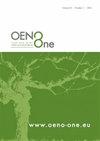Mating still disrupted: Future elevated CO2 concentrations are likely to not interfere with Lobesia botrana and Eupoecilia ambiguella mating disruption in vineyards in the near future
IF 2.2
3区 农林科学
Q3 FOOD SCIENCE & TECHNOLOGY
引用次数: 0
Abstract
The successful, area-wide application of the mating disruption (MD) technique, an insect sex pheromone-based biotechnological pest control method, against the European grapevine moth Lobesia botrana and the European grape berry moth Eupoecilia ambiguella, has led to drastic reductions in insecticide application in vineyards. However, since insect pheromone perception and emission can be affected by abiotic conditions, the future success of MD may be affected by climate change. At the same time, politics and society are calling for drastic and sustainable reductions in pesticide application, making highly specific, efficient, and environmentally friendly pest control techniques like MD more important than ever. To anticipate whether climate change factors will interfere with the MD of L. botrana and E. ambiguella in vineyards, we conducted field experiments in the Geisenheim VineyardFACE (Free-Air Carbon dioxide Enrichment) facility. The insects were raised at ambient or elevated temperatures in the lab and male moths were released in cages installed in the VineyardFACE facility. Trap recapture rates obtained by pheromone lures or female moths under elevated or ambient CO2 in areas with and without MD were evaluated. Our results did not indicate a reduced efficacy ofL. botrana or E. ambiguella MD at elevated CO2 concentrations, irrespective of the temperature the moths were raised under. From a practical point of view—and especially from an ecological one—our results are good news. They indicate that MD will not be negatively affected by future elevated CO2 concentrations.交配仍然中断:在不久的将来,未来二氧化碳浓度的升高可能不会干扰葡萄Lobesia botrana和Eupoecilia ambiguella在葡萄园的交配中断
交配中断(MD)技术是一种基于昆虫性信息素的生物技术害虫防治方法,成功地在全地区应用于欧洲葡萄蛾和欧洲葡萄莓蛾,导致葡萄园杀虫剂使用量大幅减少。然而,由于昆虫信息素的感知和释放会受到非生物条件的影响,因此未来MD的成功可能会受到气候变化的影响。与此同时,政治和社会都在呼吁大幅和可持续地减少农药的使用,这使得像MD这样高度具体、高效和环保的害虫防治技术比以往任何时候都更加重要。为了预测气候变化因素是否会干扰葡萄树杆菌和双歧杆菌在葡萄园中的生长,我们在Geisenheim葡萄园face (Free-Air Carbon dioxide Enrichment)设施进行了现场实验。这些昆虫在实验室的环境温度或高温下饲养,雄蛾被释放到安装在VineyardFACE设施的笼子里。评估了在有和没有MD的地区,信息素引诱或环境CO2下雌蛾的捕集率。我们的结果没有显示l的疗效降低。在二氧化碳浓度升高的情况下,无论在何种温度下,这些飞蛾的生长都会受到影响。从实际的角度来看,尤其是从生态的角度来看,我们的结果是个好消息。它们表明,MD不会受到未来二氧化碳浓度升高的负面影响。
本文章由计算机程序翻译,如有差异,请以英文原文为准。
求助全文
约1分钟内获得全文
求助全文
来源期刊

OENO One
Agricultural and Biological Sciences-Food Science
CiteScore
4.40
自引率
13.80%
发文量
85
审稿时长
13 weeks
期刊介绍:
OENO One is a peer-reviewed journal that publishes original research, reviews, mini-reviews, short communications, perspectives and spotlights in the areas of viticulture, grapevine physiology, genomics and genetics, oenology, winemaking technology and processes, wine chemistry and quality, analytical chemistry, microbiology, sensory and consumer sciences, safety and health. OENO One belongs to the International Viticulture and Enology Society - IVES, an academic association dedicated to viticulture and enology.
 求助内容:
求助内容: 应助结果提醒方式:
应助结果提醒方式:


